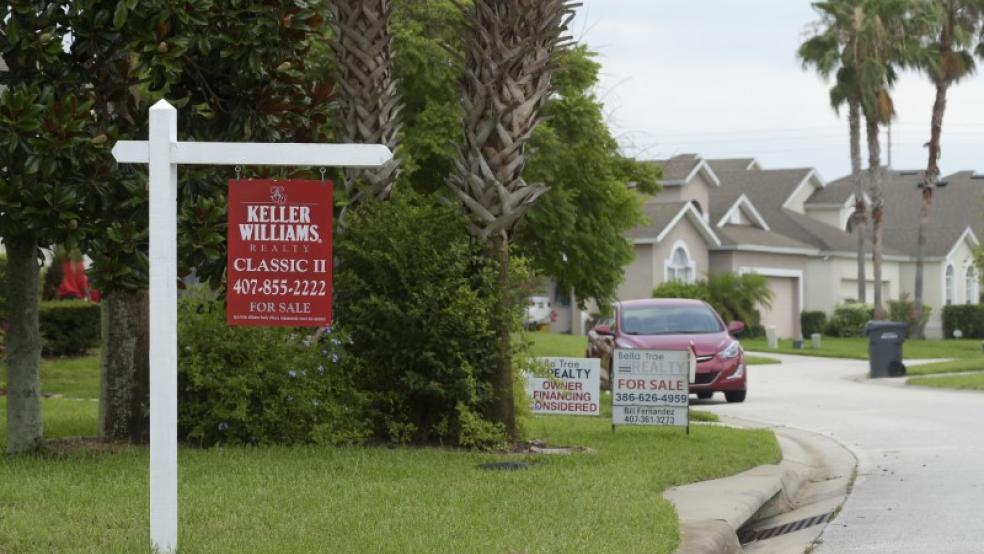WASHINGTON (Reuters) - U.S. home resales fell more than expected in July after four straight months of strong gains, as a lack of inventory limited choice for buyers, but further price rises suggested the housing market remained on solid ground.
The slump in sales reported by the National Association of Realtors on Wednesday is likely to be temporary, given that a tightening labor market is steadily pushing up wages and mortgage rates are near historically low levels. Existing home sales declined 3.2 percent to an annual rate of 5.39 million units last month, the NAR said. It blamed the drop in sales on the dearth of properties on the market, which lifted the median house price 5.3 percent from a year ago. "Without a large choice, it is hard for people looking for homes to find something they want and that seems to be the problem facing the housing market," said Joel Naroff, chief economist at Naroff Economic Advisors in Holland, Pennsylvania. Economists had forecast sales slipping 0.4 percent to a 5.51 million-unit pace in July. Home resales were down 1.6 percent from a year ago. A separate report from the Federal Housing Finance Agency showed house prices rose 1.2 percent in the second quarter. They were up 5.6 percent from the second quarter of 2015.U.S. financial markets were little moved by the data, with investors looking ahead to Federal Reserve Chair Janet Yellen's speech on Friday at a global central bankers' conference in Jackson Hole, Wyoming. The broader PHLX housing index <.hgx>, which includes builders, building products and mortgage companies, was down 0.50 percent. The Fed raised interest rates at the end of last year for the first time in nearly a decade, but has held them steady this year amid concerns over persistently low inflation. Most economists expect another rate hike in December.MILLENNIALS' IMPACT ON HOUSINGEconomists believe that demand for housing will be driven by the so-called millennials, a demographic group that has seen an improvement in job prospects since the end of the 2007-2009 recession. Unemployment among Americans in the 25-34 age bracket has plummeted since January 2015, with the share of those holding a job at the highest level since September 2008.First-time home buyers accounted for 32 percent of existing home transactions in July, up from 28 percent a year ago, the NAR said."We have been touting the upside for housing this year and the belief it will carry the economy along with consumption," said Steve Blitz, chief economist at M Science in New York. "Our basic upside view on housing is rooted in a sufficient recovery of 25-to 34-year-olds with a job, the length of time they have been gainfully employed, and the cheap cost of a mortgage."The government reported on Tuesday that new home sales vaulted to a nine-year high in July.Existing home sales fell in the Northeast, the South and the Midwest in July, but rose 2.5 percent in the West. Higher house prices, however, do not appear to be enticing homeowners to put their properties on the market. Economists speculate that the firming labor market has reduced the desire to move for employment reasons, reducing the number of potential sellers of homes.The stock of homes for sale inched up 0.9 percent to 2.13 million last month, but supply was down 5.8 percent from a year ago. At July's sales pace, it would take 4.7 months to clear the stock of houses on the market, up from 4.5 months in June. A six-month supply is viewed as a healthy balance.Underscoring the inventory tightness, houses typically stayed on the market for 36 days in July, down from 42 days a year ago. Supply is also being squeezed as the flow of foreclosed properties dries up. The share of distressed property sales dropped to 5 percent in July, the smallest share since October 2008, from 6 percent in June. The NAR said rising prices were causing problems with appraisals, leading to delays in closing contracts."The run-up in home prices has also made it difficult for appraisers to evaluate properties," said Anika Khan, a senior economist at Wells Fargo Securities in New York. "With many homes selling at or above asking prices, homes are often not appraising at high enough values to qualify for a mortgage, which has led to delays in closings." (Reporting by Lucia Mutikani; Editing by Paul Simao)U.S. existing home sales decline, prices still strong

© Phelan Ebenehack / Reuters



